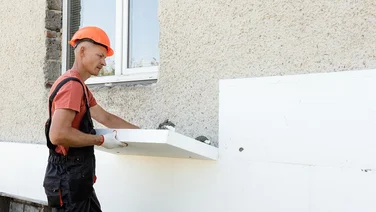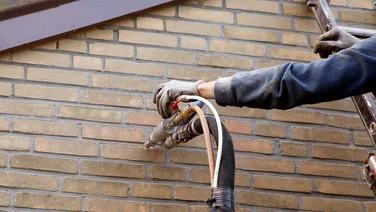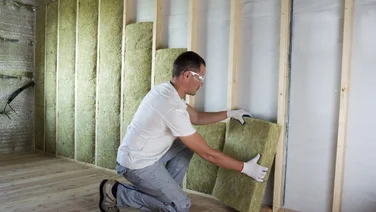We receive a small fee from trusted installers when you request a quote through our site. This helps us keep our content independent, well-researched and up to date – Learn more
- ECO stands for Energy Company Obligation
- It enables energy companies to help tackle fuel poverty
- ECO4 is the final phase of the scheme and will be scrapped in March 2026

ECO4 is the fourth phase of the Energy Company Obligation (ECO) – a government-funded scheme that makes UK homes more energy efficient and tackles fuel poverty.
Since 2013, more than 3.1 million home improvements have been made under the scheme, but this final phase aims to go even further. In November 2025, Chancellor Rachel Reeves announced she was scrapping the ECO4 scheme, saying that it was wasteful and didn’t help households cut their energy bills.
It is set to be replaced by the government’s Warm Homes Plan, but we don’t have details on that yet.
Find out everything you need to know about ECO4 below, including what the scheme covers, who’s eligible for it, and how to apply.
What is the ECO4 grant?
ECO4 is the fourth stage of the government’s Energy Company Obligation (ECO) scheme. As part of its Sustainable Warmth Strategy, the government has extended the ECO grant for an extra four years and will run until March 2026.
The primary goal of this grant is to support low-income households who are unable to upgrade their homes and heating systems with different types of solar panels, heat pumps, and other low-carbon technology.
By doing this, the government will be able to help vulnerable people power their homes, while helping the country reach its net zero by 2050 goal.
The 2024 National Home Energy Survey revealed that only 6% of the UK public is aware of the ECO4 grant, and on average, they’re only aware of 1.7 low-carbon technology schemes.

Get free solar panel quotes
Answer a few quick questions, and our trusted installers will send you bespoke solar panel quotes – for free.
How is ECO4 different from ECO3?
Although there are a lot of similarities between phase three and four of the ECO scheme, the government is aiming to reach more people during this final stage.
Under ECO3, energy suppliers with more than 150,000 domestic customers were obligated to support eligible applicants. Although this is currently the case for ECO4, the government is hoping to remove obligation thresholds by introducing “a buy-out mechanism”, meaning smaller companies are also able to participate in the scheme.
The government has also changed the eligibility criteria for ECO4 while looking for ways to help low-income families who aren’t receiving benefits.
The ECO4 report states that 46.1% of fuel-poor households are not in receipt of benefits. To support these low-income groups, the government vaguely states that it will “expand and reform local authority flexibility, so that suppliers can deliver up to 50% of their obligation via that route.”
At the same time, the government is removing some benefits that were previously available under ECO3 “to help better target households which are more likely to be on low incomes”.
Non-means-tested benefits that were previously available under ECO3 but aren’t offered on ECO4 are:
- Disability Living Allowance (DLA)
- Personal Independence Payment (PIP)
- Attendance Allowance
- Carer’s Allowance
- Severe Disablement Allowance
- Industrial Injuries Disablement Benefit
- War Pensions
- Mobility Supplement
- Constant Attendance Allowance
- Armed Forces Independence Payment
You might also want to check out: ECO+: Everything you need to know
What does ECO4 cover?
Depending on which energy supplier you go for, you could get a range of different home improvements.
To give you an idea of the type of support you can get with the ECO4 grant, take a look at the key areas of interest below:
Insulating homes
The ECO4 scheme takes a fabric-first approach, which means it focuses on improving the building itself before installing new heating systems.
In fact, any home with an efficiency rating of ‘D’ or below will have to install loft, roof, and exterior-facing cavity wall insulation before improving any existing heating systems.
The government’s ECO4 report shows a specific interest in insulating solid walls – aiming to carry out 22,000 solid wall insulation instalments each year.
Repairing boilers
We’re all familiar with the phrase ‘waste not, want not’, right? Well, the saying also applies to our household appliances.
The government claims that “to date, we have seen no boiler or electric storage heater repairs” through the scheme. Instead of repairing efficient gas boilers, people are replacing them after around three to eight years – far before the end of their expected lifetime of 12 years.
This is why ECO4 will incentivise repairing efficient heating systems where possible. Any broken heating systems that cannot be repaired can be replaced through the Broken Heating Cap – which brings us to our next point. You can learn more about how much this would cost without ECO4 on our page on boiler repair costs.
Installing greener heating systems
ECO4 focuses on replacing old, worn-out boilers with greener alternatives.
To make sure the country hits its net zero by 2050 goal, the ECO3 scheme excluded coal-fuelled heating systems. ECO4 has continued this rule, while also adding oil- and LPG-fuelled heating systems to the exclusion list.
Instead, the government will encourage people to replace their boilers with greener alternatives, namely heat pumps and biomass boilers. ECO4 will also continue to install solar photovoltaics (PV) in all electrically heated homes – but only if a biomass machine or District Heat Network has been ruled out.


Get free solar panel quotes
Answer a few quick questions, and our trusted installers will send you bespoke solar panel quotes – for free.
Who is eligible for ECO4?
The government’s ECO4 scheme aims to support the least energy-efficient homes in the country, with a focus on low-income and vulnerable households.
One of the main ways companies must measure who’s eligible for the ECO4 scheme is to see if the applicant receives any of the following benefits:
- Income-based Jobseekers Allowance (JSA)
- Income-related Employment & Support Allowance (ESA)
- Income Support (IS)
- Pension Credit Guarantee
- Credit Working Tax Credit (WTC)
- Child Tax Credits (CTC)
- Universal Credit (UC)
- Housing Benefit
- Pension Credit Savings Credit
The government will also make sure that anyone with additional Department of Work and Pension (DWP) benefits has access to ECO4, regardless of whether they receive Universal Credit.
While the focus will be primarily on owner-occupied homes, this new phase of the grant will also support inefficient social housing and private rented housing (if the landlord permits it).
How to apply for ECO4
- Firstly, get in touch with one of the energy suppliers that are offering it.
- You’ll then be taken through a telephone assessment, which will include answering questions about various things, including your income, whether you receive certain benefits, and your property’s energy efficiency rating.
- The installer will then arrange a date to visit your home and confirm whether it’s suitable for the grant.
Which energy companies offer ECO?
All gas and electricity companies with more than 150,000 customers are obliged to fit ECO measures. As it stands, the list of energy suppliers includes:
- British Gas
- E (Gas and Electricity)
- E.ON
- Ecotricity
- EDF
- ESB Energy
- Octopus Energy
- Outfox The Market
- OVO Energy
- Scottish Power
- Shell Energy
- SO Energy
- The Co-Operative Energy
- The Utility Warehouse
- Utilita Energy
You don’t have to approach your current energy supplier, either – simply opt for the company that best suits your needs.
If you’d like to get in touch with any of these companies about the ECO scheme, check out their contact details on the Ofgem website.
How well known is the ECO4 scheme?
According to the 2024 National Home Energy Survey, just 6% of people in the UK are aware of the ECO4 scheme, and 27% are unaware of any grants at all.
This means energy providers, councils and the government have a huge amount of work to do to promote how LCT can cut energy bills and emissions.
Why is the ECO4 scheme going to be scrapped?
The ECO4 scheme will be scrapped because it has failed to deliver on its objectives, essentially to help low-income families bring their bills down through installing green technology.
It also saw allegations of fraud and misuse by installers in a damning report in October 2025.
It will be replaced by the government’s Warm Homes Plan, but we don’t know what will be the contents as of yet.
Summary
- Experts have suggested that the recent energy crisis could push 8.5 million households into fuel poverty, meaning they’ll struggle to heat or power their homes.
- By extending the ECO scheme for another four years, the UK government could help some of these vulnerable people get through the difficult times ahead.
- If you think you’re eligible for the ECO scheme, what are you waiting for? Get in touch with one of the listed energy suppliers above and get the ball rolling.

Get free solar panel quotes
Answer a few quick questions, and our trusted installers will send you bespoke solar panel quotes – for free.








